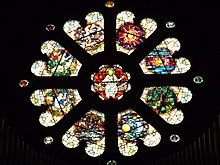This article needs additional citations for verification. (September 2023) |



The culture of Ireland includes the art, music, language, literature, folklore, cuisine and sport associated with Ireland and the Irish people. For most of its recorded history, the country’s culture has been primarily Gaelic (see Gaelic Ireland). Strong family values, wit and an appreciation for tradition are commonly associated with Irish culture.
Irish culture has been greatly influenced by Christianity, most notably by the Roman Catholic Church, and religion plays a significant role in the lives of many Irish people. Today, there are often notable cultural differences between those of Catholic, Protestant and Orthodox background. Some references to God can be found in spoken Irish, notably exemplified by the Irish equivalent of “Hello” — “Dia dhuit” (literally: "God be with you").
Irish culture has also been influenced by Celtic, Anglo-Norman, Viking, English and Irish Traveller culture. The Anglo-Normans invaded Ireland in the 12th century, and the 16th/17th century conquest and colonisation of Ireland saw the emergence of Tudor English culture repurposed in an Irish style. The Plantation of Ulster also introduced Scottish elements, mostly confined to Northern Ireland. Over centuries, Irish Travellers have introduced nomadic traditions and other cultural practices into the broader cultural tapestry of Ireland. However, notable cultural differences persist between the Traveller population and the country’s settled population. Ireland has also been influenced by a history of migration from Eastern Europe.[1][2][3]
Due to large-scale emigration from Ireland, Irish culture has a wide reach in the world, and festivals such as Saint Patrick's Day (Irish: Lá Fhéile Pádraig) and Halloween (which finds its roots in the Gaelic festival Samhain) are celebrated across much of the globe.[4] Irish culture has to some extent been inherited and modified by the Irish diaspora, which in turn has influenced the home country. Moreover, the culture of Ireland is to some degree influenced by its native folklore and legends, such as those detailed in Lebor Gabála Érenn.[5]
- ^ Cassidy, Lara M.; Martiniano, Rui; Murphy, Eileen M.; Teasdale, Matthew D.; Mallory, James; Hartwell, Barrie; Bradley, Daniel G. (12 January 2016). "Neolithic and Bronze Age migration to Ireland and establishment of the insular Atlantic genome". Proceedings of the National Academy of Sciences. 113 (2): 368–373. doi:10.1073/pnas.1518445113. ISSN 0027-8424. PMC 4720318. PMID 26712024.
- ^ O'Malley, Aidan; Patten, Eve (2013). Ireland, West to East: Irish Cultural Connections with Central and Eastern Europe. Peter Lang Ltd, International Academic Publishers. ISBN 978-3034309134.
- ^ Dublin, Trinity College. "Ukraine lays bare our collective ignorance of Central and Eastern Europe". www.tcd.ie. Retrieved 19 January 2024.
- ^ "The origin of Halloween lies in Celtic Ireland" Archived 8 June 2017 at the Wayback Machine. Irish genealogy
- ^ King, Jeffrey (2019). "Lebor Gabála Erenn". World History Encyclopedia. Retrieved 16 April 2024.
© MMXXIII Rich X Search. We shall prevail. All rights reserved. Rich X Search


